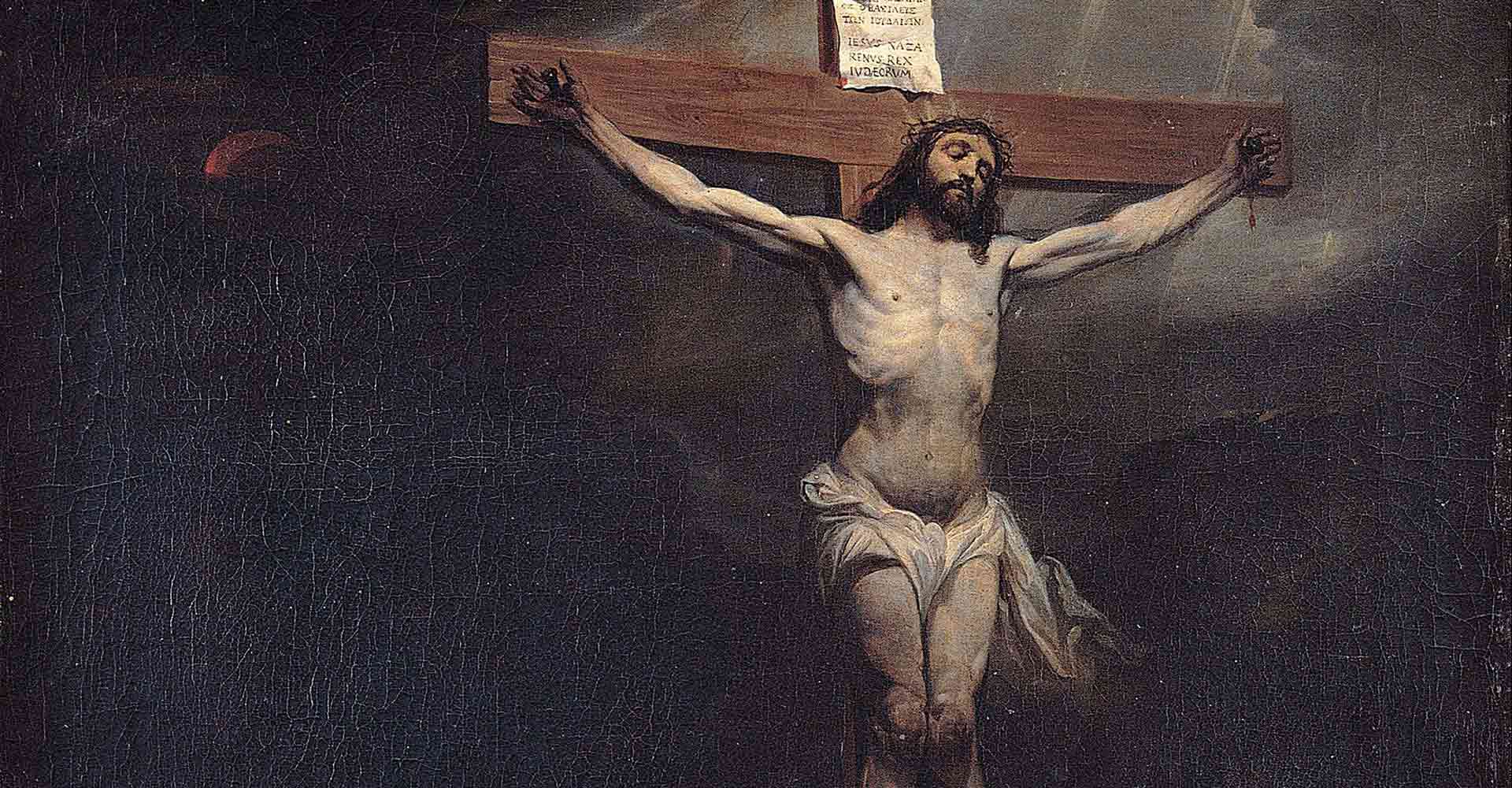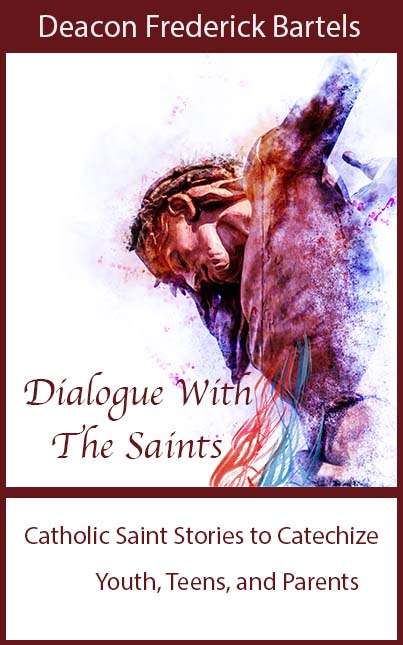The Church preaches Christ crucified. When they came to the place called the Skull, they crucified True God and True Man, cruelly fixing his sacred Humanity upon a Roman Cross.
By Deacon Frederick Bartels
28 April 2010
As they looked upon the Crucified Son, the rulers “sneered” at Jesus and said, “He saved others, let him save himself if he is the chosen one, the Messiah of God.” The soldiers, too, “jeered” at him, calling out, “If you are the King of the Jews, save yourself” (see Lk. 23:33-38).
It is evident that the soldiers who mocked Jesus did not understand who he truly is. Thus we could say that they failed to distinguish or recognize reality as it is; for it is reality that the Man they nailed to the cross was—is—the Son of God. In their misunderstanding, they jeered at him. “If you are who you say you are,” said they, “save yourself.” The soldiers had in mind that the Messiah of God should act differently than he indeed willed to act; they could not understand why he would not use his power in a way that they imagined it ought be used.
We see this same type of jeering and mocking continue on this very day in the way the Catholic Church Christ himself founded a short time before he hung on the cross is persecuted. There are those today who, in effect, exclaim of the Church: “If you are who you say you are, then act as I imagine you would.” But what type of Church is it that they imagine God would install on the world? One inhabited by sinless men completely removed from a fallen humankind who inhabit a fallen world? One that is not truly Mother Church but, rather, a distant and unknown stepmother?
It is unnecessary to go into detail concerning the scandals of abuse which periodically surface within the Catholic Church. Suffice it to say that every devout Catholic who sees the Church correctly and in the light of reality as it is, is saddened and disappointed and even angered at these tragic, sinful events. However, Catholics who see the Church as she is are not destroyed by these events, nor will they abandon their Holy Mother Church in anger over the sins of men who have fallen in some way. Precisely because these Catholics recognize the Church in a proper and true light, they remain ever-faithfully in love with her; obedient to her words of truth, thirsting for her sacraments of life—especially the highest of all sacraments: the body, blood, soul and divinity of Christ in Eucharist.
Read about the crucifixion of Christ on a Roman cross.
It will come as a shock to the worldly, but there are Catholics who so clearly see the Catholic Church as she is, that they would rather die than part from her; they would rather suffer barbaric torture than willingly dissent from her words of truth; and they would rather be run through by sword than forsake the wondrous, life-giving sacraments her loving hands administer which Christ himself so selflessly instituted. In fact, should it appear that nearly every earthly member of clergy and laity alike were caught up in grave sin these pious Catholics would continue to participate in Mass, thirst for Eucharist, and enter the confessional in order to experience that brilliant grace of forgiveness received in the sacrament of Reconciliation.
Why is this so? Simply because, unlike the Roman soldiers who jeered at Christ, devout, obedient and prayerful Catholics know the Catholic Church is both divine and human: when they look upon the Church they see Christ. They see the Church battered and wounded, as was Christ’s sacred humanity on the cross, but they see beyond humanity and into the depths of truth where they recognize the divine presence of the Son of God who so lovingly gave of himself to his Bride. By their love, they are given a glimpse into that divine and indescribable Love whose delicate brilliance is beyond understanding.
Christ is the light of the world (Jn. 8:12) from which the Catholic Church receives its light, life, being, mission and truth (see Mt. 16:17-19; 28:18-20; Jn. 16:13). “The Church is not merely a society of men and women; it has a certain sacred dimension because of the inseparable union which Christ established between it and Himself. Only in the light of that union can the Church be seen in the proper perspective” (The Teaching of Christ: A Catholic Catechism for Adults, 159).
The soldiers’ failure—or inability—to discern that God Incarnate had clothed himself in flesh and blood and become Man allowed for their erroneous view of reality. They did not recognize Christ on the cross as he is. And, in a similar way, many today fail to comprehend the divine dimension of the Catholic Church whose body is the Mystical Body of Christ, which is a body of earthly members of flesh and blood as well as members who occupy the heavenly realm as saints. The Church therefore transcends what is merely visible, reaching beyond and into the completeness and totality of reality as it is, joining heaven and earth together in union with and through and in Christ.
Christ promised to be with his Church to the end of time (Mt. 28:20). We too should be with his Church until the very end. What are we actually saying to our Lord when we, on the one hand, claim we know and love him, but, on the other, dissent from what his Bride who is guided by the Holy Spirit teaches? What does it mean to say we trust Jesus yet distrust the very Catholic Church who belongs to him?
Yet it is often not a simple matter of distrust. There is a certain prideful conceit, disdain, often even flat-out rejection of what Christ himself teaches us through his Catholic Church. In arrogance, loving themselves as if they were gods, some stand once again with the rulers and soldiers, sneering at Jesus, taunting him with their own ideas of what he ought to do, how he ought to act, and what he ought to teach. Many would have it that Christ’s teaching should bend and sway in the winds of modernist relativism, that they might mold his words to fit their desires, and remake his Church into whatever malleable and worldly institution they themselves deem appropriate.
The Catholic Church cannot, however, change in a negative way, distancing herself from what is true. For she is Christ’s Bride; her eyes are ever-fixed on her Savior; loving, attentive, giving of herself without reserve as Jesus gave of himself completely on the cross. As we look on this relationship of oneness and unity, the light begins to flood in. In the reality of Christ’s divinity and humanity, we taste also the reality of the Church he founded; for as his sacred Humanity was scourged so too is the humanity of his Bride. Yet the suffering of such scourging gives way to joy.
Therefore the Catholic Church continues onward amid hardships inflicted from within and without, announcing the life-giving truths of the Faith. Vatican II explains that, “The Church, ‘like a pilgrim in a foreign land, presses forward amid the persecutions of the world and the consolations of God,’ announcing the cross and death of the Lord until He comes (cf. 1 Cor. 11:26). By the power of the risen Lord, she is given strength to overcome patiently and lovingly the afflictions and hardships which assail her from within and without, and to show forth in the world the mystery of the Lord in a faithful though shadowed way, until at the last it will be revealed in full light” (Lumen Gentium 8).
The Catholic Church will continue to faithfully show forth that mystery of the Truth and the Way and the Life (Jn. 14:6) that is our Lord until the end of time. There is no amount of persecution which can put an end to what God has willed. Empires and nations have come and gone, and they will continue to rise and fall, but the Church will remain. Let us affirm with pious trust in Christ’s word that the Church is what he promised it is, and act accordingly.
“His dominion is vast and forever peaceful, from David’s throne, and over his kingdom, which he confirms and sustains by judgement and justice, both now and forever. The zeal of the LORD of hosts will do this!” (Is. 9:6).
God has given his children an indescribable and indispensable treasure in the fullness of truth that is contained in the Catholic Church alone. When a man, woman or child finds this truth and adheres to it, there is a wonderful, radiant security that rests in their heart. No longer do they wander about hindered by this valley of darkness, entangled by insecurity, confusion, and the sort of nervous emptiness that results from that dry thirst of uncertainty. What was before painfully dark is replaced with warmth and Love.
Thus in this bond of intimate Love, Catholics taste of the heavenly reality of the Church, though the full glory of such a reality does not appear here on earth, as they share in the union of love and life in Christ with the saints in heaven along with the Father and the Holy Spirit. In true love for God, in keeping his commandments in love and obedience (Jn. 14:15), a wonderful, supernatural event becomes a possibility—even here, even now.
“Whoever has my commandments and observes them is the one who loves me. And whoever loves me will be loved by my Father, and I will love him and reveal myself to him” (Jn. 14:21).
Photo Credit: Gabriël Metsu [Public domain], via Wikimedia Commons

Deacon Frederick Bartels is a member of the Catholic clergy who serves the Church in the diocese of Pueblo. He holds an MA in Theology and Educational Ministry, and is a Catholic educator, public speaker, and evangelist who strives to infuse culture with the saving principles of the gospel. For more, visit YouTube, iTunes and Twitter.


A breath of fresh air in a world consumed by the consumptive desires of mankind. The TRUE LIGHT, Life and Love of God as testified to in the gospel is vastly different than that preached from it today.
Thank you for this writing, even us preachers need inspiration from like minded individuals; that inspiration is getting harder to find as the world gets colder.
Thank you for your wisdom and guidance.
It is so, so it is.
Bless you my friend.